| Srl | Item |
| 1 |
ID:
124395
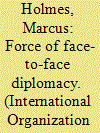

|
|
|
|
|
| Publication |
2013.
|
| Summary/Abstract |
Face-to-face diplomacy has long been the lynchpin of international politics, yet it has largely been dismissed as irrelevant in theories of cooperation and conflict-as "cheap talk" because leaders have incentives to dissemble. However, diplomats and leaders have argued for years that there is often no substitute for personally meeting a counterpart to hash out an agreement. This article argues that face-to-face diplomacy provides a signaling mechanism that increases the likelihood of cooperation. Face-to-face meetings allow individuals to transmit information and empathize with each other, thereby reducing uncertainty, even when they have strong incentives to distrust the other. The human brain has discrete architecture and processes devoted to parsing others' intentions via cues in face-to-face interaction. These processes enable actors to directly access the intentions of others with a higher degree of certainty than economic and game-theoretic models of bargaining predict.
|
|
|
|
|
|
|
|
|
|
|
|
|
|
|
|
| 2 |
ID:
131892
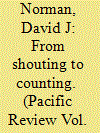

|
|
|
|
|
| Publication |
2014.
|
| Summary/Abstract |
This article explores the emergence of new spaces for civil society organisations (CSOs) as a result of an increasing interest by international donors in multi-stakeholder approaches to good governance under the 'new policy agenda'. Drawing upon a contemporary case study of civil society in Cambodia, it argues that CSOs have been encouraged to perform two key roles on a national level: professional service delivery agents and democratic watchdogs. Both roles are seen by donors as integral to supporting an accountable and professional model of the Cambodian state while drawing upon valuable private sector lessons in a synergetic model of governance. The result is the construction of particular neoliberal spaces for CSOs operating as technical implementation mechanisms in response to externally driven donor pressures. Furthermore, under this new framework of governance, CSOs face pressure to undergo internal transformation akin to new public management reform; embracing economistic and administrative modes of coordination as core values of civil society participation.
|
|
|
|
|
|
|
|
|
|
|
|
|
|
|
|
| 3 |
ID:
142403
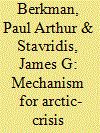

|
|
|
| 4 |
ID:
131711
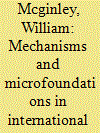

|
|
|
|
|
| Publication |
2014.
|
| Summary/Abstract |
This article looks at prospects for a mechanism-based research strategy in the study of International Relations. Over the past three decades, the notions of mechanism and microfoundation have taken a central place in discussions of explanation and 'micro-macro' problems in social science. The upshot of much of this discussion has been a call for mechanism-based explanations - explanations of macro-level phenomena in terms of micro-level mechanisms. Some work of this kind can already be found in IR theory, including in systemic research. However, a number of IR theorists, including Kenneth Waltz and Alexander Wendt, have argued that micro-oriented strategies like this will not work, pointing to incongruities between system- and unit-level phenomena. This article argues that these pose less hindrance to a fully-developed model of mechanism-based explanation, and that the field has much to gain from further exploration of this strategy. In particular, mechanism-based explanations could help bring structure back to the centre of discussion in IR theory, and might even give us a way out of the field's own micro-macro problems.
|
|
|
|
|
|
|
|
|
|
|
|
|
|
|
|
| 5 |
ID:
084190


|
|
|
| 6 |
ID:
134992
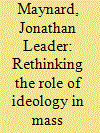

|
|
|
|
|
| Summary/Abstract |
There is a widespread sense amongst theorists of genocide and other violent atrocities that ideology matters. But in spite of this agreement all is not well with actual efforts to theorise ideology's role. Theoretical and empirical coverage has been uneven, and there has been little if any effort to incorporate theories and research from the actual specialist field of contemporary ideology studies. As a result, overarching theoretical accounts of the role ideology plays in violent atrocities remain limited and problematic. This article aims to encourage theorists to think about ideology in a more systematic and productive fashion by analysing four questions: (a) what do we mean by ideology?; (b) who, in cases of atrocity, might be relevantly affected by ideology?; (c) how do these people come to be influenced by atrocity-justifying ideologies?; and (d) how might ideology encourage these people to commit, or permit, mass violence? In discussing these four questions, I aim to clear up a number of misconceptions or vagaries that frequent current analyses of ideology in works on atrocity and political violence. I ultimately offer a suggestive account of six recurring “justificatory mechanisms” which collectively describe some of the common features of ideology's role across cases of mass atrocity.
|
|
|
|
|
|
|
|
|
|
|
|
|
|
|
|
| 7 |
ID:
116179
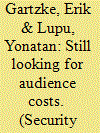

|
|
|
| 8 |
ID:
131953
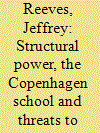

|
|
|
|
|
| Publication |
2014.
|
| Summary/Abstract |
This article engages with current debates surrounding China's security by employing the concept of structural power and the Copenhagen School approach to security studies to measure threats to China's security. Building on existing Chinese and English language research on China's security drivers, the article develops a mechanism for determining how China's economic relations with small states in Asia negatively affect their domestic stability and how this instability then loops back to undermine China's strategic position. The article uses China's relations with Cambodia, Nepal and Mongolia as case studies.
|
|
|
|
|
|
|
|
|
|
|
|
|
|
|
|